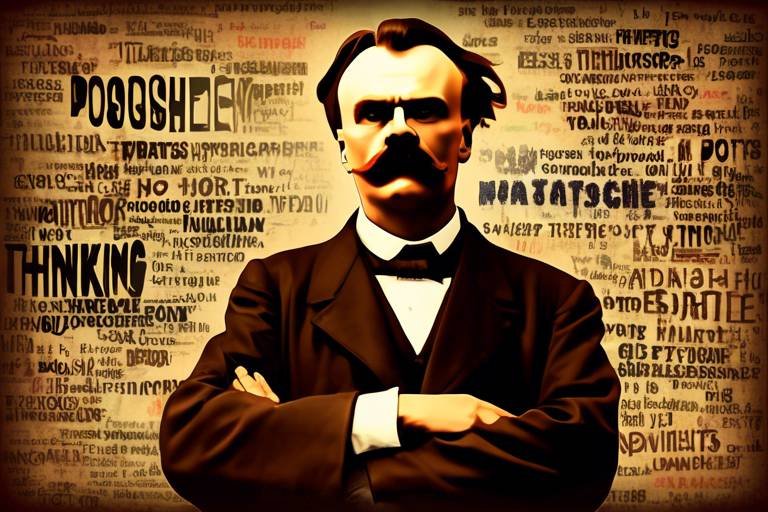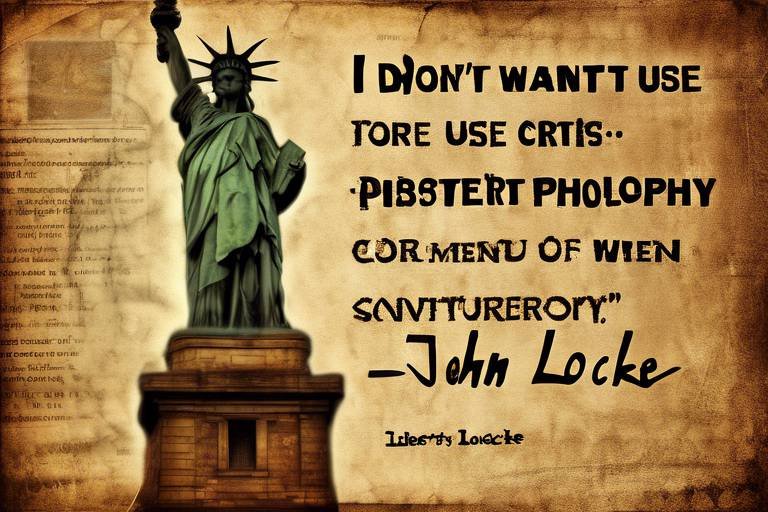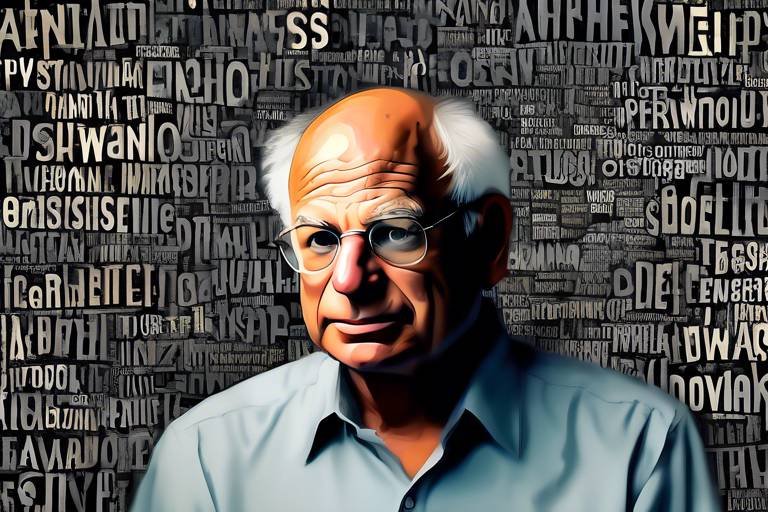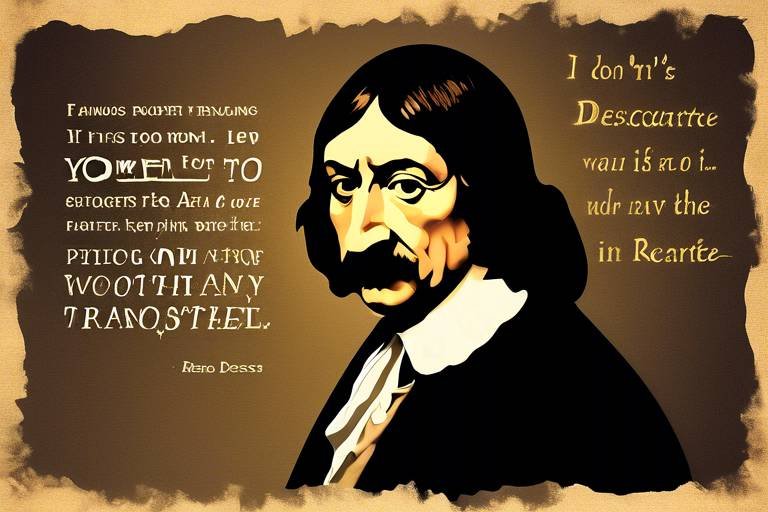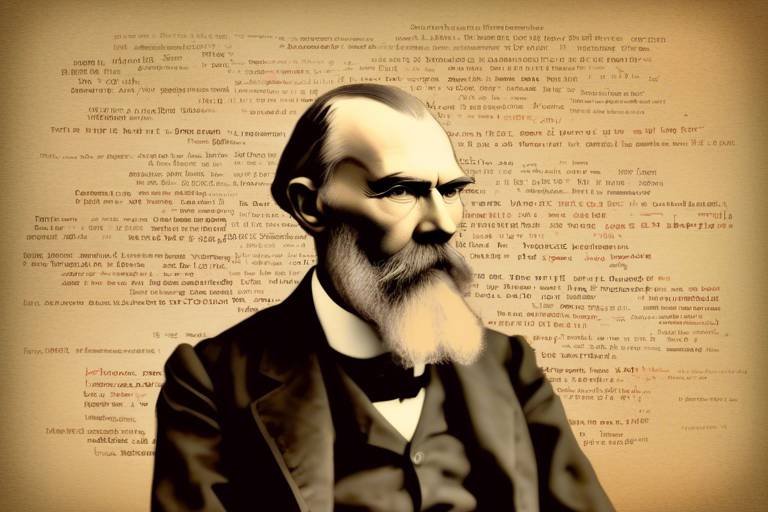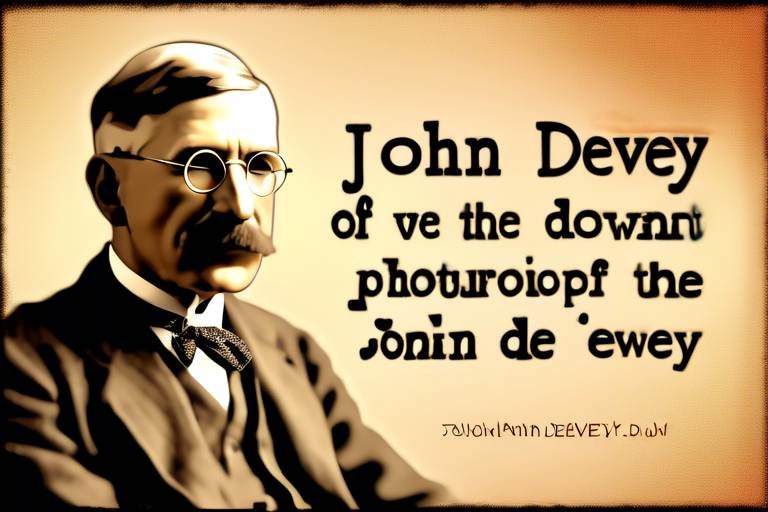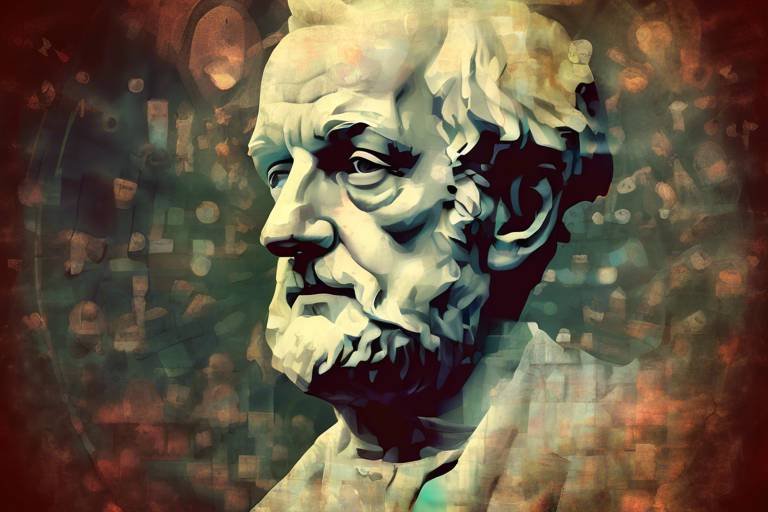Analyzing Humanity - A Look Into Paul Ricoeur's Philosophical Thoughts
In the vast landscape of philosophy, few thinkers have ventured as deeply into the complexities of human existence as Paul Ricoeur. His profound insights offer a unique lens through which we can examine our identities, ethical responsibilities, and the intricate narratives that shape our lives. Ricoeur's work challenges us to consider not just who we are, but how we come to understand ourselves and others through the stories we tell. This article delves into his remarkable philosophical insights, exploring the interconnections between narrative, ethics, language, and memory, ultimately revealing the rich tapestry of what it means to be human.
At the heart of Ricoeur's philosophy lies the idea of narrative identity. This concept suggests that our identities are not fixed entities but rather dynamic constructs shaped by the stories we tell about ourselves. Imagine your life as a book, where each chapter represents a different phase of your journey. The narratives we craft help us make sense of our experiences, allowing us to weave together the fragmented moments of our lives into a coherent whole. Ricoeur posits that through these narratives, we gain a sense of purpose and direction, ultimately guiding our actions and decisions.
Ricoeur's exploration of ethics is deeply intertwined with the notion of responsibility. He emphasizes that ethical action is rooted in our recognition of the inherent dignity of others. This perspective invites us to reflect on our interconnectedness and the moral obligations that arise from our relationships. When we acknowledge the presence of others in our lives, we become more attuned to the impact of our choices on their well-being. Ricoeur's ethical framework encourages us to engage with the world around us, fostering a sense of community and shared responsibility.
In Ricoeur's philosophy, interpretation serves as a vital tool for understanding both ourselves and the world. He argues that meaning is not simply inherent in texts or experiences; rather, it is something we actively construct through our engagement with them. To illustrate this, consider a piece of art. Each viewer brings their own background, emotions, and experiences to the interpretation of that artwork, leading to a multitude of meanings. Ricoeur's emphasis on interpretation underscores the importance of dialogue and exchange, highlighting how our understanding evolves through interaction with others.
One of Ricoeur's key contributions to the philosophy of interpretation is the concept of the hermeneutic circle. This idea illustrates how understanding is a cyclical process, involving a movement between the parts and the whole of a text or experience. When we read a story, for example, we may start with an initial impression of the characters and plot, but as we delve deeper, our understanding shifts and expands. This dynamic interplay between the specific and the general allows us to uncover richer meanings and insights.
Language, for Ricoeur, is not merely a tool for communication; it is a fundamental component of how we construct our realities. He explores the ways in which linguistic expressions shape our perceptions and influence our identities. Think of language as a lens through which we view the world—different languages can offer distinct perspectives and nuances. Ricoeur's examination of language highlights its power to both connect and divide us, reminding us of the importance of clear communication in fostering understanding.
Ricoeur's investigation into memory reveals the intricate relationship between individual and collective experiences. He posits that our personal memories are deeply influenced by the historical narratives that shape our societies. For instance, the stories we inherit from our families and communities inform how we perceive ourselves and our place in the world. This interplay between memory and history underscores the significance of storytelling in preserving cultural identities and values.
Time, in Ricoeur's philosophy, is a crucial factor in the formation of identity. He argues that our past experiences, present actions, and future aspirations collectively shape who we are. Consider how your past informs your decisions today and how your dreams for the future motivate your actions. Ricoeur's exploration of time invites us to reflect on the temporal dimensions of our existence, emphasizing that understanding our identity requires a holistic view that encompasses all aspects of our lived experiences.
Understanding the temporal dimensions of existence is essential in Ricoeur's thought. He suggests that our experiences are intricately linked to our understanding of time and our place within it. Just as a river flows continuously, our lives are marked by a constant movement through time, shaping our perceptions and actions. Ricoeur's insights encourage us to embrace the fluidity of our identities, recognizing that change is a fundamental aspect of being human.
Finally, Ricoeur emphasizes the role of future aspirations in identity formation. Our hopes and dreams are not merely abstract concepts; they actively influence our choices and contribute to our evolving sense of self. By envisioning our future, we create a roadmap for our actions, guiding us toward the person we aspire to become. This forward-looking perspective encourages us to remain open to new possibilities and to embrace the journey of self-discovery.
- What is narrative identity? Narrative identity refers to the way individuals construct their identities through personal stories, allowing for coherence and meaning in their lives.
- How does Ricoeur define ethics? Ricoeur defines ethics as a recognition of others' dignity and the moral obligations that arise from our interconnectedness.
- What is the hermeneutic circle? The hermeneutic circle is a concept that illustrates how understanding involves a dynamic process of moving between parts and the whole of a text or experience.
- Why is language important in Ricoeur's philosophy? Language shapes our perceptions of reality and influences how we communicate our identities and experiences.
- How does memory relate to identity? Memory connects individual experiences to collective historical narratives, shaping our personal identities and societal values.

The Concept of Narrative Identity
Paul Ricoeur's notion of narrative identity is a captivating exploration of how the stories we tell about ourselves shape our understanding of who we are. Imagine for a moment that your life is like a book, filled with chapters that detail your experiences, struggles, and triumphs. Each chapter contributes to the overall narrative, creating a coherent story that not only defines you but also influences how others perceive you. This concept emphasizes that our identities are not fixed; rather, they are fluid and constantly evolving based on the narratives we construct and share.
At the heart of narrative identity is the idea that we are, in essence, storytellers. We weave our experiences into narratives that provide meaning and coherence amid the chaos of life. Ricoeur argues that through storytelling, we can articulate our values, beliefs, and aspirations, allowing us to reflect on our past and envision our future. This reflective process is crucial because it helps us make sense of our experiences and understand our place in the world.
Consider this: when you recount a significant event in your life, how do you frame it? Do you focus on the challenges you faced, the lessons you learned, or the relationships you built? Each of these choices shapes the narrative and, consequently, your identity. Ricoeur suggests that by engaging with our personal stories, we can uncover deeper meanings and insights about ourselves. This is where the power of narrative identity shines—by embracing our stories, we can navigate the complexities of existence and find a sense of belonging.
Furthermore, Ricoeur highlights the interplay between individual narratives and collective narratives. Our personal stories do not exist in isolation; they are influenced by cultural, social, and historical contexts. For instance, the stories we tell about our identities are often shaped by the larger narratives of our communities and societies. This interconnectedness underscores the idea that understanding oneself also involves understanding the broader context in which we exist.
In summary, Ricoeur's concept of narrative identity invites us to reflect on our life stories as a means of self-discovery and understanding. It encourages us to recognize that our identities are not merely a collection of facts and experiences but rather a rich tapestry woven from the narratives we create. By embracing our stories, we not only gain insights into ourselves but also foster connections with others, enriching the human experience.
Frequently Asked Questions
- What is narrative identity? Narrative identity refers to the way individuals construct their identities through the stories they tell about themselves, emphasizing the role of personal narratives in shaping self-understanding.
- How does narrative identity influence our lives? It influences our lives by providing coherence and meaning to our experiences, helping us navigate challenges and connect with others.
- Why is the concept of narrative identity important? It is important because it highlights the dynamic nature of identity, showing that our understanding of ourselves can evolve over time based on the narratives we create.

Ethics and Responsibility
When we dive into the depths of Paul Ricoeur's ethical philosophy, we find a rich tapestry woven with the threads of responsibility and human dignity. Ricoeur posits that ethical action is not merely a set of rules to follow; rather, it emerges from our recognition of the inherent worth of others. In a world that often feels fragmented, his ideas remind us that our interconnectedness is not just a philosophical concept but a lived reality. This interconnectedness brings with it a profound responsibility to act ethically, as our actions can significantly impact those around us.
Imagine for a moment that we are all part of a vast, intricate web. Each thread represents an individual, and the connections between these threads symbolize our relationships and responsibilities towards one another. Ricoeur argues that understanding this web is crucial for ethical living. We must acknowledge the dignity of others, which entails recognizing their rights, feelings, and experiences. This acknowledgment is the first step toward fostering a more ethical society.
Furthermore, Ricoeur emphasizes that our ethical responsibilities are not isolated; they are shaped by the contexts in which we find ourselves. The recognition of others' dignity is a call to action, urging us to engage with the world around us thoughtfully. In practical terms, this means considering how our decisions affect not only ourselves but also our communities and the broader society. For instance, when making choices in our personal lives or professional careers, we should ask ourselves:
- How does my action affect those around me?
- Am I considering the long-term implications of my choices?
- In what ways can I contribute to the well-being of others?
This reflective approach to ethics aligns with Ricoeur's belief that ethical behavior is a dynamic process, one that requires continuous engagement with our moral obligations. He challenges us to move beyond a simplistic understanding of right and wrong and to embrace the complexities of ethical dilemmas. In doing so, we become more attuned to the nuances of human relationships and the responsibilities they entail.
Ricoeur's ideas also highlight the importance of narrative in shaping our understanding of ethics. Our personal stories, the narratives we tell about ourselves and others, play a crucial role in how we perceive ethical responsibilities. By sharing our experiences and listening to the stories of others, we can cultivate empathy and a deeper understanding of the moral landscape we navigate daily. This narrative approach not only enriches our ethical framework but also fosters a sense of community and shared responsibility.
In summary, Ricoeur's exploration of ethics and responsibility invites us to reflect on our role in the intricate web of human relationships. It challenges us to recognize the dignity of others and to act with intention and care. As we navigate our lives, let us remember that our choices resonate beyond ourselves, shaping the world around us and influencing the lives of others. By embracing our responsibilities, we can contribute to a more ethical and compassionate society.
- What is the main idea of Ricoeur's ethical philosophy?
Ricoeur emphasizes the significance of responsibility and the recognition of others' dignity as fundamental to ethical action. - How does narrative play a role in ethics according to Ricoeur?
Narratives shape our understanding of ourselves and others, fostering empathy and a deeper awareness of our ethical responsibilities. - Why is interconnectedness important in ethics?
Interconnectedness highlights our moral obligations to others and encourages us to consider the impact of our actions within the broader community.

The Role of Interpretation
In the realm of philosophy, the act of interpretation serves as a vital thread weaving through the fabric of understanding. For Paul Ricoeur, this process is not merely an academic exercise; it is a fundamental aspect of what it means to be human. Ricoeur posits that our grasp of ourselves and the world around us hinges on our ability to engage with various texts, symbols, and experiences. This engagement is not passive; rather, it is an active dialogue that allows us to uncover deeper meanings and truths that lie beneath the surface of our everyday experiences.
Imagine trying to piece together a jigsaw puzzle without knowing what the final picture looks like. Each piece represents a different aspect of our lives—our memories, our interactions, our cultural narratives. Just as we must turn and manipulate the puzzle pieces to see how they fit together, we must also interpret the myriad facets of our existence to construct a coherent understanding of ourselves. Ricoeur's philosophy encourages us to embrace this interpretative process as a means of self-discovery and connection with others.
Moreover, interpretation is not confined to individual experiences; it extends to our relationships with others and the broader society. When we engage with the narratives of those around us, we open the door to empathy and understanding. This is where Ricoeur's emphasis on the ethical dimension of interpretation comes into play. By interpreting the stories of others, we acknowledge their experiences and dignity, fostering a sense of responsibility toward one another.
To illustrate the importance of interpretation, consider the following key points:
- Dynamic Engagement: Interpretation is a fluid process that requires us to revisit and reconsider our understanding of texts and experiences.
- Context Matters: The meanings we derive from interpretations are heavily influenced by our personal and cultural contexts, making the act of interpretation deeply subjective.
- Dialogue and Reflection: Engaging with others’ narratives encourages dialogue, prompting us to reflect on our own beliefs and assumptions.
In essence, Ricoeur’s exploration of interpretation reveals its transformative power. It is through interpretation that we can navigate the complexities of our identities and the world around us. By embracing this process, we cultivate a richer understanding of ourselves and our relationships, ultimately leading to a more profound appreciation of the human experience.
- What is the significance of interpretation in Ricoeur's philosophy?
Interpretation is central to understanding oneself and others, allowing for a deeper engagement with texts, symbols, and experiences. - How does interpretation relate to ethics in Ricoeur's thought?
Ricoeur emphasizes that interpreting others' narratives fosters empathy, responsibility, and recognition of their dignity. - Can interpretation change over time?
Yes, interpretation is a dynamic process influenced by personal experiences and cultural contexts, leading to evolving understandings.

The Hermeneutic Circle
In the realm of philosophy, Paul Ricoeur introduces the concept of the hermeneutic circle, which serves as a pivotal framework for understanding how we interpret texts, experiences, and ultimately, ourselves. This idea posits that comprehension is not a linear process; rather, it resembles a circular movement where one oscillates between the parts and the whole of a given text or experience. Imagine reading a book: as you delve into each chapter, you constantly refer back to previous ones, allowing the details to shape your overall understanding of the narrative. This interplay is what Ricoeur emphasizes as essential for grasping deeper meanings.
The hermeneutic circle challenges the notion that we can ever fully grasp the meaning of a text in isolation. Instead, it suggests that our understanding evolves as we engage with both the smaller elements and the broader context. For instance, when interpreting a poem, one might focus on the individual words and phrases, yet the greater significance only emerges when considering the poem as a whole. This dynamic interaction between the parts and the whole is vital in constructing meaning, as it reflects our human experience of learning and understanding.
Ricoeur's hermeneutic circle also highlights the importance of prejudices—the preconceived notions we bring into our interpretations. These biases can either enrich our understanding or hinder it, depending on how we navigate our interpretations. It's a bit like wearing glasses: if they’re tinted, they can distort what you see, but if you adjust them, you might gain clarity. Thus, recognizing our own biases is crucial in the hermeneutic process, as it allows us to engage with texts and experiences more authentically.
To further illustrate this concept, consider the following table that summarizes the key elements of the hermeneutic circle:
| Element | Description |
|---|---|
| Parts | Individual elements of a text or experience that contribute to meaning. |
| Whole | The overarching context that shapes the interpretation of the individual parts. |
| Prejudices | Preconceived notions or biases that influence understanding. |
| Dynamic Interaction | The ongoing process of moving between parts and whole to achieve comprehension. |
Ultimately, Ricoeur's hermeneutic circle encapsulates the essence of human understanding—an intricate dance between our experiences, interpretations, and the meanings we derive from them. It invites us to embrace the complexity of interpretation, recognizing that our journey toward understanding is never truly complete but always evolving. As we engage with texts and each other, we continuously refine our interpretations, leading to richer insights and a deeper appreciation of the narratives that shape our identities.
- What is the hermeneutic circle?
The hermeneutic circle is a concept introduced by Paul Ricoeur that describes the process of understanding as a dynamic interaction between the parts and the whole of a text or experience. - Why is the hermeneutic circle important?
It emphasizes that comprehension is not linear and that our understanding evolves as we engage with both individual elements and the broader context. - How do prejudices affect interpretation?
Prejudices are preconceived notions that can either enrich or hinder our understanding, making it essential to recognize them during the interpretive process.

Language and Meaning
Language is not just a tool for communication; it is the very fabric through which we weave our understanding of the world. In Paul Ricoeur's philosophy, language serves as a pivotal element that shapes our perceptions of reality and influences the way we express our identities and experiences. Ricoeur argues that language is inherently tied to meaning, and it functions as a bridge between the self and the other, allowing us to articulate our thoughts, emotions, and narratives. This connection is not merely functional; it is deeply existential, as it allows us to navigate our lives and construct our identities.
When we think about language, it is essential to recognize that it is not static. Instead, it evolves and adapts, reflecting the dynamic nature of human experience. Ricoeur emphasizes that the meanings we derive from language are often layered and context-dependent. For instance, consider how a single word can evoke different emotions and interpretations based on the context in which it is used. This fluidity of meaning highlights the richness of language and its capacity to convey complex ideas and sentiments.
Moreover, Ricoeur introduces the concept of semantic innovation, where language constantly transforms as we engage with it. This transformation is influenced by various factors, including culture, history, and personal experiences. Language becomes a living entity, shaped by the collective narratives of society. As we engage with different linguistic expressions, we not only communicate but also participate in a shared cultural dialogue. This interaction allows us to explore our identities and the identities of others, fostering a deeper understanding of the human experience.
To illustrate the significance of language in shaping meaning, we can consider the following aspects:
- Contextuality: The meaning of words can shift dramatically depending on the context in which they are used. For example, the word "home" can evoke feelings of warmth and safety for one person, while for another, it may trigger memories of conflict and pain.
- Symbolism: Language often operates on a symbolic level, where words represent not just their literal meanings but also broader concepts and emotions. This symbolism allows for a richer exploration of identity and experience.
- Dialogue: Engaging in dialogue with others is a fundamental aspect of human interaction. Through conversation, we can share our narratives, challenge assumptions, and ultimately shape our understanding of ourselves and the world around us.
In summary, Ricoeur’s exploration of language and meaning reveals its profound impact on our identities and experiences. Language is not simply a means of communication; it is a dynamic and evolving entity that shapes our perceptions of reality. By engaging with language, we engage with our own narratives and those of others, fostering a deeper understanding of the human condition. Whether through spoken words, written texts, or even non-verbal cues, language remains a powerful force in the ongoing journey of self-discovery and connection.
- What is the significance of language in Ricoeur's philosophy?
Language serves as a crucial medium through which individuals express their identities and experiences, shaping their understanding of reality. - How does Ricoeur view the relationship between language and meaning?
Ricoeur believes that meaning is not static; it evolves through contextual use, cultural influences, and personal experiences, making language a dynamic entity. - Can language influence our perceptions of self?
Yes, language plays a vital role in constructing our identities as it allows us to articulate our narratives and engage with the narratives of others.

Memory and History
Memory and history are intertwined concepts that play a significant role in shaping our identities, as articulated by Paul Ricoeur. He argues that memory is not merely a passive repository of past events but an active force that influences how we perceive ourselves and our place in the world. When we think about our memories, we often find that they are colored by the stories we tell ourselves and the narratives that society constructs around collective experiences. This dynamic interplay between individual recollections and broader historical contexts is what makes Ricoeur’s exploration of memory so compelling.
Ricoeur posits that our personal memories are deeply affected by collective memory, which refers to the shared pool of knowledge and information that a group of people holds about their past. This concept can be illustrated through the following points:
- Collective Narratives: The stories we share as a society shape our understanding of historical events and influence how we relate to those events on a personal level.
- Identity Formation: Our identities are formed not only by our individual experiences but also by the historical narratives that we inherit from our communities.
- Ethical Reflection: Reflecting on collective memory allows us to confront past injustices and consider our responsibilities towards others in the present.
Ricoeur’s insights into memory also highlight the importance of historical narratives in shaping societal values. History is not just a collection of dates and events; it is a rich tapestry woven from the threads of countless individual and collective experiences. For instance, the way we remember significant events such as wars, revolutions, or social movements can profoundly affect our cultural identity and ethical considerations. By engaging with these narratives, we are invited to reflect on our past to better understand our present and influence our future.
Moreover, Ricoeur emphasizes that the act of remembering is inherently selective and interpretative. We do not recall every detail of our past; rather, we remember what is meaningful to us. This selectivity can lead to a nuanced understanding of history, where different interpretations coexist. In this sense, memory becomes a site of dialogue, where various perspectives can be explored and understood. This dialogical aspect is crucial for fostering empathy and promoting a deeper understanding of our shared humanity.
In summary, Ricoeur's exploration of memory and history invites us to consider how our identities are shaped by both personal and collective narratives. By recognizing the interplay between memory and history, we can better appreciate the complexities of our identities and the ethical responsibilities that arise from our interconnectedness. This understanding encourages us to engage with our past critically, allowing us to forge a more inclusive and compassionate future.
- What is the significance of memory in Ricoeur's philosophy?
Memory is crucial in Ricoeur's philosophy as it shapes individual and collective identities and influences our understanding of the past. - How does collective memory impact personal identity?
Collective memory provides a framework through which individuals interpret their personal experiences, affecting how they see themselves and their roles in society. - Why is the relationship between memory and history important?
This relationship is important because it helps us understand how historical narratives shape our values, ethics, and identities.

The Influence of Time on Identity
Time is a fascinating construct, isn’t it? It flows like a river, constantly moving, shaping our lives and identities in profound ways. Paul Ricoeur delves deep into this intricate relationship between time and identity, suggesting that our understanding of who we are is not a static snapshot but rather a dynamic interplay of our past experiences, present actions, and future aspirations. Imagine your identity as a tapestry woven from the threads of time, where each thread represents a moment that has contributed to the person you are today.
Ricoeur argues that our past experiences are like the roots of a tree, anchoring us and providing nourishment for our growth. These experiences, whether joyous or painful, shape our perceptions and influence our decisions. They are the stories we tell ourselves, the memories that linger in our minds, and the lessons we learn along the way. Each memory acts as a building block, contributing to the overall structure of our identity. For instance, think about a significant event in your life—perhaps a graduation or a loss. How did that moment shape your views, your choices, and ultimately, who you are?
Moving to the present, Ricoeur emphasizes that our actions today are informed by our past but also play a crucial role in shaping our future. Every decision we make is a stepping stone towards our evolving identity. It’s like standing at a crossroads, where the path you choose can lead you in different directions. Are you making choices that align with your true self? Or are you swayed by external pressures? This constant negotiation between who we were and who we want to become is what makes our identity fluid and ever-changing.
Now, let’s not forget about the future. Ricoeur points out that our aspirations and dreams significantly impact our identity formation. What do you hope to achieve? What kind of person do you want to become? These questions drive our actions and fuel our motivation. Think of your future aspirations as a guiding star, illuminating the path ahead. They inspire us to strive for growth, pushing us to step out of our comfort zones and embrace new opportunities. The future is not just a distant point in time; it is an integral part of our identity that beckons us to reach for more.
In summary, the influence of time on identity is a complex tapestry woven from our past, present, and future. Ricoeur’s insights remind us that our identities are not fixed but are continuously shaped by our experiences and aspirations. As we navigate through life, it’s essential to reflect on how time influences our sense of self. Are we honoring our past while actively engaging in the present and dreaming of a fulfilling future? The answers to these questions can help us understand our identities more profoundly.
- How does Ricoeur define identity? Ricoeur defines identity as a narrative construct shaped by our experiences, memories, and aspirations over time.
- What role does memory play in identity? Memory acts as a repository of past experiences that influence our current identity and future aspirations.
- Can identity change over time? Yes, identity is fluid and can change as we accumulate new experiences and insights throughout our lives.
- How can understanding time help us in our personal growth? By recognizing the influence of our past, present, and future, we can make more informed choices that align with our true selves.

Temporal Dimensions of Existence
When we dive into the , we are essentially peeling back the layers of our lives to reveal how time intricately weaves itself into the fabric of our identities. Paul Ricoeur masterfully illustrates that our understanding of who we are is not static; rather, it is a dynamic interplay of our past, present, and future. Imagine time as a river, with each moment flowing into the next, shaping our experiences and perceptions as it rushes by. This metaphor captures the essence of how our lives are continuously molded by temporal influences.
Ricoeur argues that our past experiences are like the roots of a tree, deeply embedded in the soil of memory. They provide nourishment to our current identity, influencing our decisions and actions. Every joy, sorrow, and lesson learned contributes to the vast tapestry of our narrative identity. As we reflect on these past experiences, we engage in a process of self-interpretation. We ask ourselves questions like, "How did that event shape me?" or "What did I learn from that experience?" This reflective practice is crucial as it allows us to make sense of our journey and integrate our past into our present self.
In the present, we find ourselves navigating through a myriad of choices and responsibilities. Ricoeur emphasizes that the present moment is where we hold the power to act, to make decisions that will ripple into our future. Our actions today are not isolated; they are informed by our past and will inevitably shape our future. For instance, if someone has experienced hardship in the past, they might approach current challenges with resilience, drawing on their history to guide their responses. This interconnectedness of time creates a sense of continuity in our lives, allowing us to feel grounded even amidst chaos.
Looking forward, our aspirations and dreams act as beacons, illuminating the path we wish to take. Ricoeur suggests that our hopes for the future are instrumental in shaping our identity. They influence our motivations and drive us to pursue goals that resonate with our sense of self. Consider this: if you aspire to be an artist, that dream will not only guide your current choices but will also become a part of your identity. Your future aspirations become intertwined with your narrative, propelling you forward and giving meaning to your existence.
To illustrate the relationship between time and identity, let’s consider a simple table:
| Temporal Dimension | Impact on Identity |
|---|---|
| Past | Shapes our beliefs, values, and experiences. |
| Present | Where we exercise choice and agency; how we respond to our circumstances. |
| Future | Drives our aspirations and influences our actions. |
In conclusion, Ricoeur's exploration of the temporal dimensions of existence reveals that our identities are not merely a product of our experiences; rather, they are a complex interplay of time's various facets. By understanding how our past informs our present and shapes our future, we can gain deeper insights into ourselves and navigate our lives with greater awareness and intention.
- What is narrative identity? Narrative identity refers to the internalized and evolving story of the self that individuals construct over time, integrating their past, present, and future experiences.
- How does Ricoeur define ethics? Ricoeur's ethical philosophy emphasizes the importance of recognizing the dignity of others and the responsibilities that arise from our interconnectedness as human beings.
- What role does memory play in identity? Memory serves as a bridge between individual experiences and collective history, informing personal identities and societal values.

Future Aspirations and Identity Formation
When we think about our future aspirations, it's like peering through a window into our potential selves. Paul Ricoeur emphasizes that these aspirations are not just distant dreams; they are integral to our identity formation. Imagine your aspirations as a compass, guiding you through the complexities of life. They shape our decisions, influence our relationships, and ultimately define who we are. Just as a tree grows towards the light, we tend to gravitate towards our goals, molding our identities in the process.
Ricoeur argues that our hopes and dreams act as narrative threads woven into the fabric of our lives. Each aspiration we hold is like a chapter in our personal story, contributing to the overarching narrative that defines us. For instance, if someone aspires to be an artist, that dream influences their choices, from the education they pursue to the people they surround themselves with. This narrative identity is dynamic, constantly evolving as we encounter new experiences and challenges.
Moreover, future aspirations are not formed in isolation. They often emerge from our interactions with others and the societal context we inhabit. Our families, friends, and cultures play significant roles in shaping what we aspire to become. Consider a young person dreaming of becoming a doctor; this aspiration may stem from a family history of healthcare professionals or a community that values medical careers. In this way, our identities are intricately linked to the aspirations we adopt from those around us.
Ricoeur also highlights the importance of reflection in the formation of our aspirations. As we reflect on our past experiences and the lessons learned, we begin to understand what truly matters to us. This introspection allows us to align our future goals with our core values, creating a more authentic sense of self. It's like polishing a gem; the more we reflect, the more we reveal our true brilliance.
In essence, our future aspirations are not merely lofty ideals; they are powerful forces that shape our identities. They provide direction, inspire action, and foster a sense of purpose. As we navigate life's journey, it's crucial to remain mindful of our aspirations, for they are the stars that light our path. Embracing our dreams can lead to profound transformations, enabling us to become the individuals we aspire to be.
- What role do future aspirations play in identity formation?
Future aspirations serve as guiding principles that shape our decisions and influence our self-perception, playing a crucial role in how we form our identities. - Can aspirations change over time?
Yes, aspirations can evolve as we gain new experiences and insights, reflecting our growth and changing circumstances. - How can I identify my future aspirations?
Reflecting on your values, interests, and experiences can help you identify what you truly aspire to achieve in life.
Frequently Asked Questions
- What is Paul Ricoeur's concept of narrative identity?
Paul Ricoeur's concept of narrative identity suggests that our personal stories play a crucial role in shaping how we understand ourselves. By constructing narratives, we create meaning and coherence in our lives, allowing us to reflect on our experiences and develop a sense of self over time.
- How does Ricoeur view ethics and responsibility?
Ricoeur emphasizes that ethics is rooted in the recognition of others' dignity. He believes that our moral obligations arise from our interconnectedness with others, and ethical actions stem from a deep sense of responsibility towards one another.
- What role does interpretation play in Ricoeur's philosophy?
Interpretation is central to Ricoeur's philosophy. He argues that understanding ourselves and others requires engaging with texts, symbols, and experiences. This process of interpretation allows us to uncover deeper meanings and truths about our identities and the world around us.
- Can you explain the hermeneutic circle?
The hermeneutic circle is a concept introduced by Ricoeur to illustrate the dynamic process of understanding. It involves moving between the parts and the whole of a text or experience, suggesting that comprehension is achieved through an iterative process of interpretation.
- How does language influence meaning according to Ricoeur?
Ricoeur explores the pivotal role of language in shaping our perceptions of reality. He argues that linguistic expressions not only communicate our identities and experiences but also influence how we understand and interpret the world around us.
- What insights does Ricoeur provide about memory and history?
Ricoeur highlights the interplay between individual and collective memory, showing how historical narratives inform personal identities. He believes that our understanding of history shapes societal values and influences how we perceive ourselves within a broader context.
- How does Ricoeur connect time to identity?
Ricoeur examines the relationship between time and identity by arguing that our past experiences, present actions, and future aspirations collectively shape who we are. This interconnectedness of time influences our self-perception and identity formation.
- What are the temporal dimensions of existence in Ricoeur's philosophy?
In Ricoeur's view, understanding the temporal dimensions of existence is essential. He posits that our lived experiences are intricately linked to our understanding of time, which in turn affects our sense of self and our place within the world.
- How do future aspirations impact identity formation?
Ricoeur emphasizes that our hopes and dreams play a significant role in shaping our identity. Future aspirations influence our actions and contribute to an evolving sense of self, guiding us toward who we want to become.




